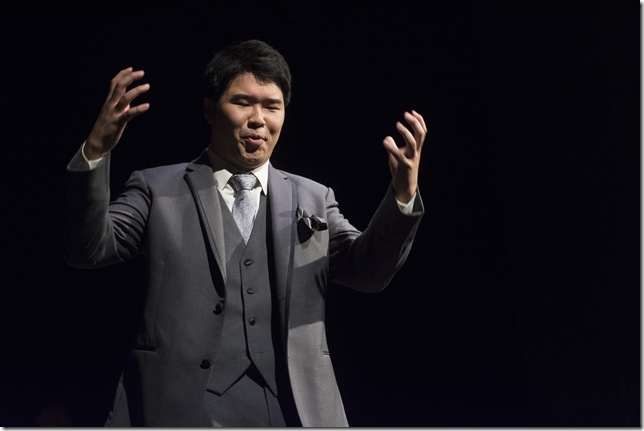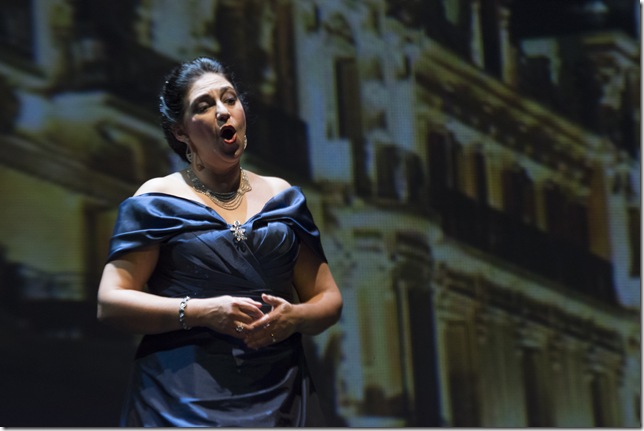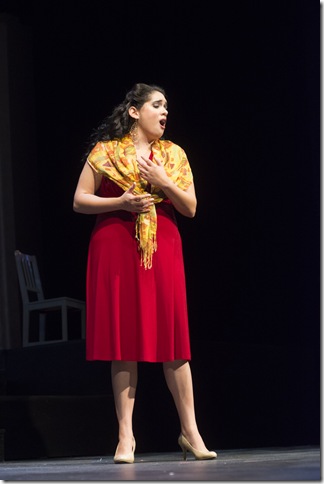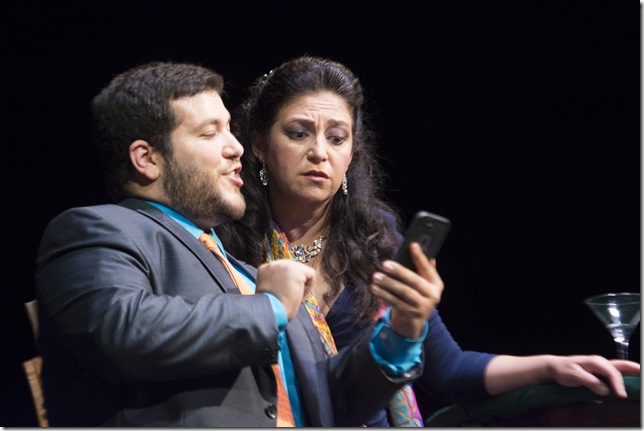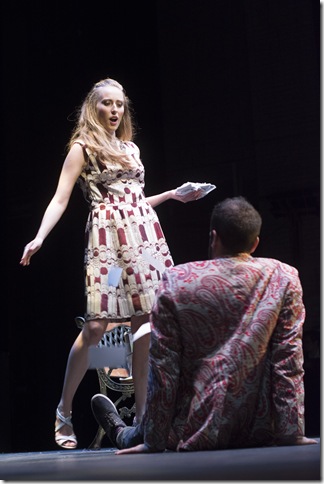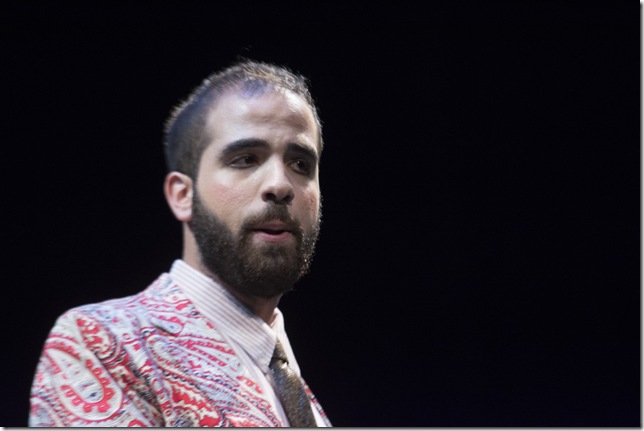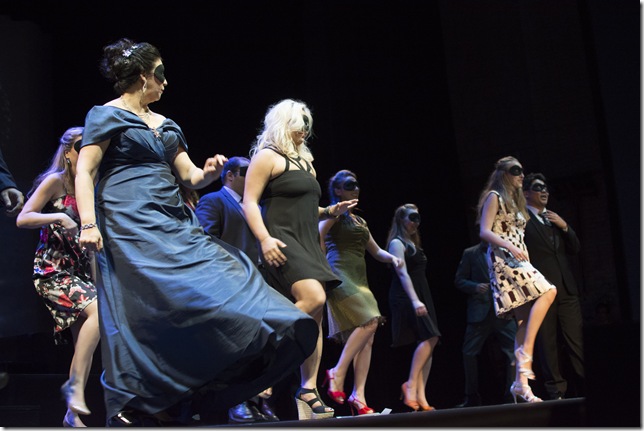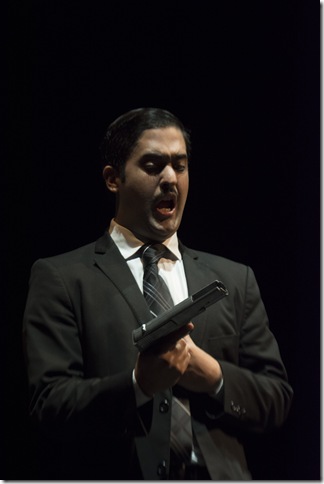The Miami Summer Music Festival closed its second season on Sunday afternoon with a remarkable performance of Mozart’s Don Giovanni, epic and uncut, and featuring several standout singers in the festival’s Opera Institute program.
Smartly and snarkily staged by Jeffrey Marc Buchman, who updated the opera to contemporary times in a gambling resort, this Don Giovanni lost only its power of menace due to the way it dealt with the arrival of the Commendatore in the final scene. But other than that, this opera was, like the first concert in the festival, exceptionally good, especially considering that it was a temporary student production assembled for the summer.
In this production, Giovanni is a rich playboy who wears a snazzy Borsalino while carrying around a suitcase full of cash and packing a switchblade in order to make a quick exit. He was sung by the young Jinyong Lee, who has a strong, clear baritone voice that never failed him, and excellent technique that allowed him to spin out beautiful singing in solo and ensemble work.
It is a measure of his accomplishment that audience members could focus with ease on the story and its supporting characters because he sang so well; only “Deh, vieni all finestra,” in Act II, was shy of the mark because he sang it a little flat. But he was a fine actor as well, coming off much like a master criminal in a police procedural yet still radiating a feeling of boldness that made you root for him in spite of his misdeeds.
As Donna Elvira, the Cuban-born soprano Yetzabel Arias, who has sung for Ton Koopman and Jordi Savall, was exceptional, with a very large, powerful voice, with something of a hard edge that made it well-suited for her character’s furious confusion. She had no difficulty with the roulades of “Ah, fuggi il traditor,” nor the acrobatics of “Mi tradì quell’alma ingrata,” and she was a believable actress who wore her frustration on her face with effectiveness.
Megan Barrera sang Donna Anna with an equally big, warmer voice that showed off the expansive top she demonstrated in her rendition of Cole Porter’s “So In Love”during the opening-night concert. In “Or sai chi l’onore,” she built admirably from the recitative into the indignant, vengeful outburst, and in “Non mi dir, bell’idol mio,” the basic generosity of her voice was keenly evident.
Both women are fine singers, and they earned huge ovations from the audience Sunday afternoon at curtain call.
Jacob Kato made a fine Leporello, with a good, solid baritone and a winning comedic sense, especially when disguised as Giovanni and finding himself in the clutches of a suddenly reignited Elvira. Roberto Lopez-Trigo was equally good as Masetto, with a deeper, darker voice and a charming acting style as someone entirely under the sway of his lady love, Zerlina.
Dorothy Gal, who sang Zerlina, has a pretty, light voice, just right for this character, but it was underpowered through much of the opera, so that her “Batti, batti” was indistinct. But she made up for it with a lovely “Vedrai, carino,” which was accompanied by very tender, persuasive stage business as the two lovers reconcile.
Tenor José Mongelos had a forceful, reedy, memorable tenor as Don Ottavio, but he had intonation difficulties in the treacherous “Dalla sua pace” (which is some ways is the antecedent of every lovelorn tenor aria to come for the next 200 years) that sounded like they stemmed from vocal tightness. If he can get his voice to relax a little more, he has the right spinto sound for romantic leads.
Bass Osvaldo Medina was the Commendatore, with a really impressive depth and color to his voice. In the final scene, he was offstage, which caused some problems with coordination of the drama and didn’t show his voice off to its best advantage.
Buchman’s staging was inventive and cheeky, and great fun. In the catalog aria, Leporello pulled out a cellphone and swiped repeatedly as he pointed out all the women in Giovanni’s digital conquest list, while projected behind Leporello and Elvira the list itself could be seen as a series of playing cards with the women’s pictures that kept multiplying as the aria went on. Finally, Elvira’s picture showed up, with a nice take of shock from Arias and a delighted response from the audience. Yuki Izumihara’s projection design for the scene worked very nicely.
In the garden scene, the entire party began to dance something like the Funky Chicken with an admixture of Gangnam style, and it was hilarious, even if the moves they made came from a different rhythmic tradition and didn’t quite fit with the 1787 version of booty shaking. And at the end, four women in stripper regalia danced with the same relative incongruity, but it fit the conception of the show and it worked well. Hats off to choreographer Rosa Mercedes for a successful realization of what had to be a tough job making the two traditions mesh.
Overall, Buchman’s vision was full of life and energy; there was no sense here of hushed reverence for Mozart and Da Ponte, just simply an engaging work of theater. This story, with its many artificialities and its roots in a long-vanished societal framework that elevated aristocrats and condoned their behaviors, was shown in this update to be not vanished at all: People with money and good looks can get what they want, and if it’s not the same as carrying a sword, it has just the same effect.
The one downside was the stone guest part of the action, with the statue simply a backdrop, and the Commendatore returning as a giant headshot on that same backdrop, with Medina singing offstage. Limited production values were to be expected with a festival this new and a story this complicated, but it still would have been preferable for there to be a real prop statue and for the Commendatore to return as one, or something closer to it. Without these things, the ending doesn’t work too well, but this opera’s familiarity allowed patrons to simply go with it.
Michael Rossi, founder of the festival, conducted, and he was most fortunate in having a marvelous student orchestra that played that first two-chord sequence right in tune and with crisp ensemble, a wonderful omen for some great playing to come. An upright piano substituted for the harpsichord, which was somewhat regrettable, but not ultimately a drawback. As with Lee’s Giovanni, the orchestra was so good that it became a fact of life in this production, not calling attention to itself but simply performing this iconic score superbly.
If the Miami Summer Music Festival is able to continue at this level of musicality, there’s no doubt that it will become a major feature of the South Florida summers for years to come. Rossi has pulled off something extraordinary in founding it, and next year’s festival, which he promises will be twice the size, is likely to be another strong step toward turning the word “Miami,” like “Aspen” or “Tanglewood,” into a synonym for spectacular music-making in the off-season.
